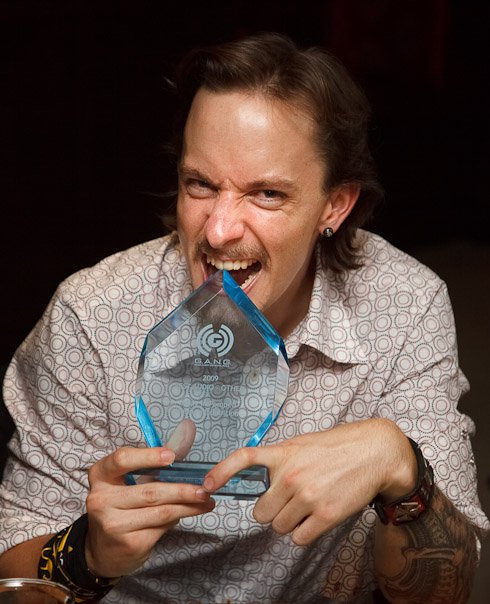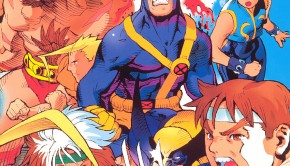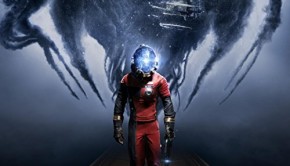Mick Gordon Interview: Rebooting Wolfenstein and Killer Instinct
Since joining the industry nine years ago, Australian composer Mick Gordon has worked on video games for top franchises such as Need For Speed, Marvel, and The Last Airbender. In the last six months, he has gained widespread mainstream recognition thanks to his stylish yet retro score for the Xbox One’s Killer Instinct. This only looks set to continue when his story-driven, guitar-fuelled score for Wolfenstein: The New Order becomes available next month.
In this fresh, honest, and humorous interview, Mick Gordon gives a tour of his works. He places particular focus on his work for Killer Instinct, Wolfenstein: The New Order, and the indie horror game Routine. Along the way, he delves into his diverse musical inspirations, his technical and musical approaches, and his need to, above all else, inspire emotions and tell stories to listeners.
Interview Credits
Interview Subject: Mick Gordon
Interviewer: Chris Greening
Editor: Chris Greening
Coordination: Chris Greening
Interview Content
Chris: Hi Mick! Welcome to Game Music Online!
Mick Gordon: CHRIS!!!! WOOHOO!!!!!!!!!!!
Chris: Before we start, could you tell us about your background, education, and influences? Were you primarily trained in the school of rock, or did you receive classical training too?
Mick Gordon: My Dad makes Guitars. He handed me one when I was 12 and I experienced that special feeling that everyone should have at least once in life — the feeling of when you find the thing you’re meant to do with your time on Earth. When you find that thing, no matter what it is, education feels like it comes naturally — what I mean is that it’s easy to spend every hour of the day thinking about music. You want to learn as much as you can. For me, that led to bands, private study, classical and jazz study, etc. It’s easy to become engrossed in what you love — it’s never work.
Chris: What artists and music inspire you?
Mick Gordon: Interesting stuff is always inspiring — at the moment, I’m loving KOAN Sound, Alva Noto, and Wardruna. Not to mention eurorack synths, resonance, creating “movement” with sounds, different ways to portray emotion, etc. There’s so much out there!
Chris: Your debut on the industry was as an in-house audio designer at Pandemic Studios Brisbane on Destroy All Humans! 2: Make Love Not War. Could you share your experiences working on this title? What did you learn about the process of making music and sounds for games?
Mick Gordon: Yes! Crypto! Gosh that seems like a while ago! Pandemic taught me things that I still use almost daily. Specifically, how a development studio works, how different disciplines work together, various implementation skills and other technical knowledge — it’s stuff that you can’t learn anywhere else other than being inside a video game studio.
Chris: The score that first brought you to my attention was The Last Airbender. I was impressed by how you perfectly set the scene for this soundtrack with beautiful orchestrations and ethnic instrumentation. Could you elaborate more on how you approached this score?
Mick Gordon: Thank you! We had four weeks to score the game and all cutscenes. Furthermore, we weren’t able to hear James Newton Howard’s score for the film due to schedule conflicts, so it was really a guessing game. However, the Airbender world is very inspiring and lends itself well to melody and drama, so the job is very easy when you have rich material to work with.
Chris: How did you get the soundtrack sounded so good despite presumably having a tight budget and deadline?
Mick Gordon: Well again, thank you! It helps when you have amazing musicians to work with, such as the inspiring violinist, Jeff Ball. I’ve worked with Jeff a bunch if times — the process always starts with me giving him a ludicrous idea and then he turns it into something awesome. Once I asked him to make car noises for a Need for Speed trailer, and he gladly sent me a video showing how he transformed his violin into a V8 using nothing but a while glove and an aggressive bow! A lot of The Last Airbender score is very simple, but it’s Jeff’s performance that makes it special.
Chris: Your soundtracks for the Marvel Super Hero Squad series are totally fun with their retro, rocking flavour. Could you tell us how you approached these projects? Were they enjoyable to work on?
Mick Gordon: Oh, these were massive fun — the first was a fighting game and the other two were action platformers, and the TV show, like Airbender, is rich source material. Plus it’s Marvel, who’ve created some of the most recognised and loved characters on the planet! Music for kids games is always a blast — you can be as crazy, unpredictable and varied as you like!
Chris: Despite producing some great games, the studios you initially worked at (i.e. Pandemic, Blue Tongue, FuzzyEyes) having been closed. Were the demises of these developers and THQ a big blow to you? Why has the industry been so cruel to Australia in the past five years or so?
Mick Gordon: I don’t think the industry has been cruel to Australia — I guess it’s more of a reflection of a dynamic industry that evolves and adapts so quickly worldwide. Studios shutting down and cancelled projects are horrible experiences to everyone involved, but a studio is just a building with a name — the people make it special, and the people are always there afterwards. They put themselves back together, get inspired again, form new studios and make new games.
Chris: You’ve gone on from these studios to score major international gigs with Electronic Arts on Need For Speed, Microsoft on Killer Instinct, Bethesda on Wolfenstein, and Ubisoft on ShootMania
Mick Gordon: Ha! That’s a difficult question! I really like to become deeply engrossed in a project. Look, I know it’s essentially a business and we make a product for a market, but I try to aim for a higher standard than that. I strongly believe we create art for the next generation. For me, it’s story telling, it’s making something that sticks in the players mind long after they’ve switched the console off. It’s about deeply engrossing yourself in the game’s world, the characters, and what’s happening to them. Simply triggering battle-music-cue-154 just because enemies have appeared on screen is boring to me — I want to create something that resonates inside the player.
Chris: Focusing on the Need For Speed series, you led the score for Need For Speed: World and have also produced numerous original tracks and remixes for Shift, Shift 2, and The Run.
Mick Gordon: I’ve learned so much from the Need for Speed games. The creative team behind those games have a big challenge — every game is about cars, but they constantly find a strong creative direction for each project. World was about connecting people, Shift was putting players in the mind of an elite driver through abstract musical sound design, Shift 2 was scored by remixing pop tracks to suit different emotions, and The Run was a film-like experience with pressure and action. Nobody ever said to me “oh, it’s just a car game, make some racing music…”. They were focused on creating strong creative directions.
Chris: Looking back at your contributions to the series, which tracks are you most proud of and why?
Mick Gordon: When I started on World, the first track I did was called “Static” (see the SoundCloud above) and I sent it off to Joël Diezel, the audio director on the game. His idea was to play the track only when the player left their car sitting in the world for a period of time (while they were checking messages, taking a break, etc). Anyway, fans really dug the tune. It resonated with them. It stuck with them after they walked away from the game — those are always cool moments.
Chris: The first soundtrack that brought you a tonne of international attention was the Xbox One’s Killer Instinct. How did you ensure the score for this title both paid tribute to the original games, while still offering something new and modern? Was it a challenge to get the balance right?
Mick Gordon: Oh man, I loved Killer Instinct when I was a kid. I played it for hours. I listened to Killer Cuts for hours. Those visuals, sounds and melodies are imprinted on my brain. Robin Beanland and Graeme Norgate have given the world some of the best video game music ever written. For me, well, I’m lucky enough to be able to dip into their universe and play around for a little while, but it’s their strong music in Killer Instinct that made it special. My job was to simply deconstruct their music from 1994, and reconstruct it for 2013.
Chris: Much of your Killer Instinct score featured arrangements of the main theme and character themes of the original game for Arcades. What was it like to work with this source material – inspiring or intimidating? Did you have any interactions with original composers Graeme Norgate and Robin Beanland while making the soundtrack?
Mick Gordon: It’s both — it’s a feeling of utter elation coupled with complete terror. Robin is still over at Rare and he has been incredible — early on he sent us these backup ADATs of the original session from 1994, which was just amazing. He’s a super nice guy, but it’s crazy speaking with him… my mind is like, “oh that’s very interesting”, and then “f—, this is Robin Beanland!”, and then “oh, so that’s how he did that!”. They both wrote some amazing melodies and it has been wonderful to have an opportunity to go back over their stuff and really analyse what was going on. They certainly nailed a beautiful simplicity which is rarely matched.
Chris: On the Need For Speed and Killer Instinct franchises, you have often blended multiple forces and styles together into single tracks. Can you tell us more about your creative process when creating fusion tracks? Are there many technical challenges involved?
Mick Gordon: Great question, and I’m glad you noticed! Blending styles, usually, comes out of trying to solve a problem – often you’ll receive creative direction where someone says something like, “make it like Rusko and Holst”. The challenge is putting those two things together – you can’t take one and put the other on top. You can’t just record a full orchestra and then put guitar over it; that ends up sounding like an orchestra with a guitar over it…
The trick is finding a balance and score based on the mix. If you’re going to have bass guitar, then you’ll cut out your double basses. If you’re going to have guitar, the cellos and trombones will probably go. If you have a drumkit, then say good-bye to your timpani. This way you’re selecting instrumentation based on it’s placement in the mix. If you have a clash where two things occupy the same space, then one must go or be altered so it’s somewhere else. In the end, the goal is to give the listener a feeling and tell a story. Whatever achieves that result is the best.
Chris: From what I’ve heard so far, it seems that you are moving away from typical Hollywood-styled scores for Wolfenstein: The New Order in favour of a more original approach. Is this correct?
Mick Gordon: Yes! Absolutely! Again, glad you noticed! Wolfenstein was an amazing experience – again, a team of inspiring people full of great ideas. At the start of the project I visited Sweden and we spotted the game from start to finish over three days. And it was just great to have that involvement and meet with the team. We we’re able to come up with a fairly solid idea of every spot in the game that required music. It was awesome. I mean, usually you sign onto a project and then you’re given a list of 150 battle cues to do. But this was different. It was character and narrative
Chris: Could you tell us more about what we can expect from the music when it is released next month?
Mick Gordon: We’ll be talking about the music in the coming weeks leading up to release, but yeah, it’s a fun project. The music, hopefully, reflects the game and the story: it’s raw, it’s aggressive, it’s tragic, it’s disturbing, it’s fragile, it’s irregular. It’s something I loved doing from start to finish.
Chris: You’ve said in the past that you’d absolutely love to score a horror game and now you’re getting the chance with Routine. Should we assume that you’re excited to be part of it?
Mick Gordon: Routine is a dream project for anyone. You’re tasked with exploring an abandoned Moon base and it’s set in an 80s vision of the future. So it’s floppy disks and analogue! Who wouldn’t be excited about that? I’ve taken on the entire audio role, which I’m having a lot of fun with.
Chris: Can you tell us how you’ll be approaching this one?
Mick Gordon: Again, for me it’s story telling, and sometimes a single sound effect can tell a lot more story than music can. It also allows me to produce all the content with the mix as the focus. Especially the dynamic range, which we’ve lost in games. Remember those great horror films of the 70s and 80s? It was dynamic range that made them scary. Take that scene from Alien, when the crew are looking for the Facehugger that’s fallen off John Hurt’s face. The room is dark, and they’re walking around looking for it, and it’s almost completely silent. Then, when the scare comes, it’s super loud — the dynamic range tells that story better than the sounds themselves.
Chris: Looking to your non-game works, you were incredibly proud to serve as the audio director of A Day in Pompeii. For the readers not in-the-know, could you tell us more about this exhibition and your huge role on it?
Mick Gordon: Oh, Pompeii was marvellous. Absolutely marvellous. It’s basically a narrative driven museum exhibition that exhibits artefacts from Pompeii prior to 79AD and leading up to the eruption of Mt Vesuvius. It starts in everyday life, showing objects used for trade and commerce, work, art, infrastructure, etc. Then the audience is shown a seven minute 3D film that shows the devastation of the eruption. Afterwards they’re lead through areas dedicated to the volcano itself and the ash and immense heat that was experienced by the townspeople. The exhibition concludes with actual bodycasts of people and animals who were frozen in their final moments. It’s very confronting.
Our role was to tell the story through sound – these areas are all set up to look like the streets of Pompeii, so we have people bantering in Latin while going about their day. Then we have the eruption, so there’s lots of destruction and panic going on, followed by ash falling and the ground shaking. We used music to tell the emotional journey – it was an amazing project.
Chris: Are there any other non-game projects you’d like to tell readers about?
Mick Gordon: As for others, I also designed the musical sound design for Rogers Arena up in Vancouver for the Canucks games. The live hockey match is treated like a video game, where the music ramps up and down according to what the players are doing and how they’re performing. In the end, I’m inspired by the use of music and sound to tell stories. Whether that’s the people of Pompeii in their final moments, a player winning a race, Spider-Man kicking butt, the loss a soldier experiences in a dictatorship, Jago pulling off an Ultra combo, or the Canucks coming down to a shoot out.
Chris: Despite working on so many scores, you have released very few soundtracks beyond a now-expired free download for The Last Airbender and an addition each to Novum Initium and Impostor Nostalgia. Would you consider using Bandcamp or SoundCloud to make your past soundtracks available? Is there any hope for soundtrack releases for Killer Instinct, Wolfenstein: The New Order, and Routine?
Mick Gordon: I’d love to have everything up for people to listen to – usually it comes down to final ownership and who has the rights to sell the music. We’re doing a soundtrack for Routine. For the others, “stay tuned” is all I can say at the moment.
Chris: Finally, I’m emigrating to Australia to take up a position in your much-loved capital city next month. Is a Pom likely to survive over there? 
Mick Godon: Oh MAN!!!! You’re going to love it! Canberra can get cold, but you’ll love the nature that’s super close. There’s many places to hike, explore, climb… I almost moved to Canberra myself a few years ago. I’m down in Melbourne now, and you’ll have to come down to experience — what I would humbly call — the best coffee and food in the world. You will survive and thrive man!
Just watch out for the drop bears and hoop snakes and you’ll be fine.
Oh, and you might wanna avoid redbacks, crocodiles, taipans, box jellyfish, brown snakes, black snakes, tiger snakes, death adders, copperhead snakes, sea snakes, blue ringed octopus, stone fish, cone shells, great whites, bull sharks, tiger sharks, funnel webs, trapdoors, irukandji, bull ants, ticks, cassowaries, Mosquitos, mushrooms, and politicians.
Chris: Haha, will definitely keep my eyes peeled for those — a couple of politicians in particular! Many thanks for your time today, Mick. Is there anything else you would like to say about your life or works? Do you have any messages for those reading this? All the best for the future!
Mick Gordon: Of course! I can’t leave without telling you how awesome it is to have a site like Game Music Online. You guys are absolutely incredible. All us music-people work so hard — hidden away in our studios tinkering with sounds and melodies for hours on end pouring life and soul into everything we do, and it’s amazing to have a website that celebrates video game music. You guys push us to a higher standard, and that creates better games. So thank you!!!
Posted on April 17, 2014 by Chris Greening. Last modified on April 17, 2014.















